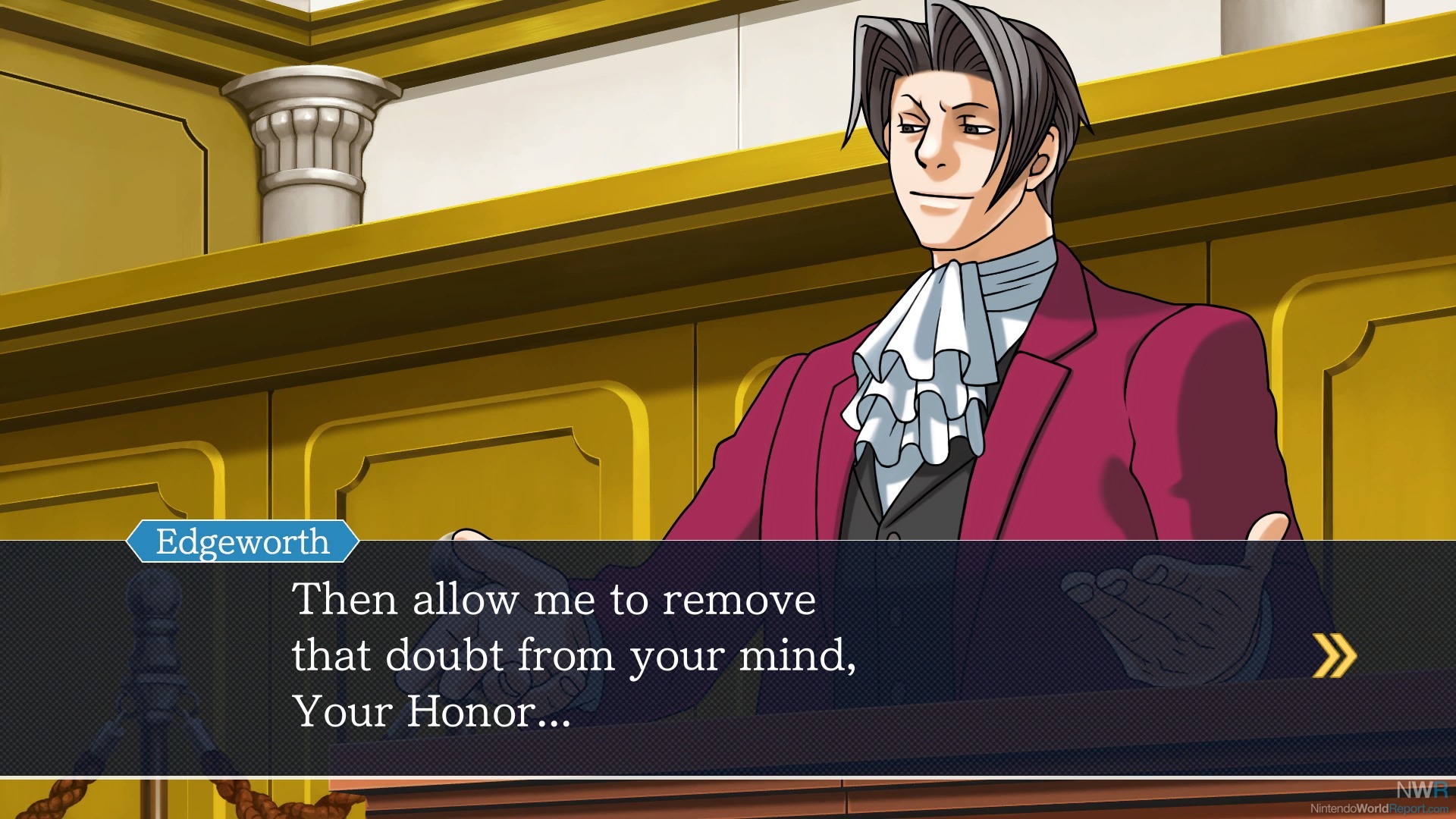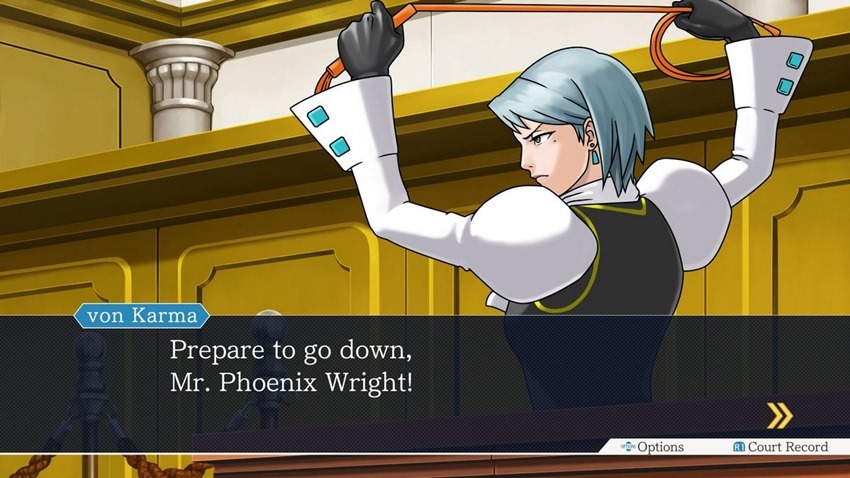Over the last year or so it feels like I have gravitated to investigation games more frequently. Last year I played two Sherlock Holmes games on the channel, enjoyed some time in The Sinking City, wandered the mean streets in Blacksad: Under the Skin, to name just a few. It is no surprise that, sooner or later, I would make my way to the much-loved Phoenix Wright: Ace Attorney series. And having now completed the HD Trilogy on PC, I can see why this old Nintendo DS classic has been the recipient of a great deal of praise.
While many instalments in the series have been published over the years, the HD trilogy on PC is composed of the first three primary games. After completing them I can only hope that Capcom have plans to facilitate a remaster of the rest of the series, because the unfolding story across the first three games was such a great experience and I want more! I can honestly say the story alone is one of the biggest reasons I will urge people to treat themselves to this game.

The game has several additional mechanics that keep the visual novel format interesting, such as being able to pick locations to visit and looking for clues to use in court and help the client. On occasion you get to play with new methods of investigation including examining key items of evidence for small details and fingerprint dusting. You can also talk with the different people around the area and get information from them, all of which builds a ‘court record’ of items and people of interest to the case. Descriptions for these entries can change as you gain new info and showing these items to characters in the world may get them talking about what they know. A lot of the time conversations or items are critical and will be added to your record, while other portions of a conversation will not but will help your overall understanding of the situation regardless. So, in short, talk to everyone, multiple times, and show them everything!
Having never played the games on the DS handhelds, I have no reference as to how the HD games differ control wise. However, the HD Trilogy games play very well on the PC and both the controller and keyboard and mouse can be used equally well.
I have read there was some discontent over the HD redesigns of the characters as fans of the original releases felt the game had lost its pixel-sprite charm in exchange for a more cartoon-like aesthetic. When you compare images of the DS and the PC versions, you can see that while the characters have been faithfully redrawn and are essentially the same, they do differ from an overall art-style perspective so I guess I can see what they mean to a point. What matters to me, though, is that they don’t stand out like a sore thumb from the environment’s art-style which have also been given the same redraw treatment.
As for the sound design, again I have no first-hand experience with the original games but there is certainly a classic Nintendo vibe from both the UI sounds and the music which leaves me feeling happy in a nostalgic way. I am not sure if the sounds were remastered at the very least, but it is clear they have not been fully remade.
The real draw of these games is the unfolding story of the characters. Through the first game the cases generate a rolling backstory for Phoenix and his rival, Prosecutor Edgeworth, that will culminate towards the final climactic case of the game. Several lingering pieces will begin to fall into place and, through the second and third games, they too will become major plot points that have a deep impact on the main characters. New prosecutors are brought into the story as Phoenix’s next rival, each with some kind of axe to grind with him. Also, several characters, both witnesses and even former defendants, will return to the game bringing their own unique personalities to new cases.

Overall, I was genuinely impressed by not only the gradually increasing depth of the characters and their story arcs, but also the rocksteady continuity of the ongoing storyline through to the end of the third and final game. I am not saying that the story is in any way realistic, far from it in fact. There is drama by the bucket load, mystical happenings, larger-than-life characters, and some of the situations of the cases are quite outlandish. And that is putting it mildly. They are very entertaining, though, and that is all that really counts in my book.
Overall, the game gets a glowing recommendation from me, though I would like to point out a few small things that came up through the gameplay. Rarely in some of the cases, especially in the second game “Justice for All”, Phoenix would find nothing he could use to crack open a lying witness. Instead he would simply guess by picking some piece of evidence to present, regardless of there being a contradiction, and hope the witness slips up on their own by running their mouth a little too much.
Here is where I had less fun than in the rest of the game because there was no information given to me as the player that told me what Phoenix was thinking. It became a guessing game for me to figure out what I was meant to present to the court, and against which part of a witnesses testimony. All I would get to go on is Phoenix cryptically stating something like “I have no choice but to bluff now and hope they slip up. Maybe… if I use that evidence…”
Like, what? Really?! This became a frustrating exercise of trial and error, saving and reloading with each failure that cost me more favor with the judge represented by a health bar. I don’t like to do this too much in games like this but I felt it was unavoidable in some cases where the game was being blatantly cryptic to an impenetrable degree. And even after I stumble upon the correct action, I would sit there trying to figure out if I missed something obvious that was meant to clue me in as the player.
The environmental exploration part of the game also had similar moments where I was stabbing away in the dark, absent any leading dialogue, trying to see what I was meant to do next. Between court sessions you can run around and discover evidence, as I mentioned earlier. Thankfully, the game does not progress until you have done all the required interactions and found all you can find. However, knowing what you need to find is sometimes not clear at all and you can be walking around for ages prodding and poking all the things, talking to all the people again, showing them all your evidence, until you find that one thing that changed since the last time you spoke to someone or went to a location. Then, you can finally move on!
Despite these small issues, I would still say the game is very solid all round and well worth playing, if nothing else than for the story alone. It took me a long time to get through them all, (135 hours!) but that is mostly due to me having to read the dialogue out loud for my audience on stream, as well as other stream-based distractions such as chatting with viewers and talking people through my wild theories about what was actually going on. (I was usually always way off the mark but hey that is half the fun!) Reading in your head is so much faster so I would say you could get through each game in the series in around 50-60 hours, making the trilogy pack very good value for money.
Happy trials!
